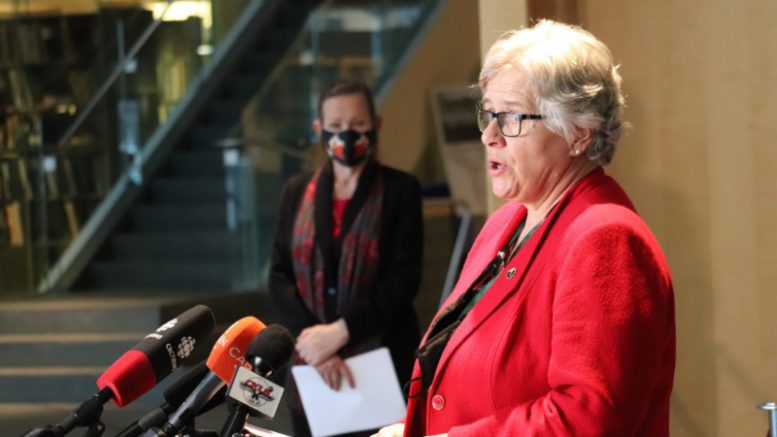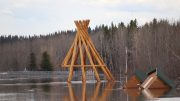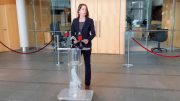For the second year in a row a state of emergency was declared in order to establish a temporary day shelter in Yellowknife.
On Friday afternoon, the Government of the Northwest Territories (GNWT) announced it will be using modular structures, previously used for the Tłı̨chǫ All-Season Road work camp, that will be set up at the former Frontier Visitors Centre location.
The shelter is scheduled to be opened by late November, in the meantime the Yellowknife Arena will be used to provide the needs the day shelter fills, but this won’t begin until Oct. 25.
Since the arena is outside of downtown, Sara Chorostkowski, HSS director of mental health and addiction recovery, says the city and GNWT will need to provide transportation services so clients can access the arena.
“The arena is definitely a far walk from the Salvation Army where a lot of the the service users spend the nights, we recognize that transportation is going to be key,” Chorostkowski says.
Yellowknife Mayor Rebecca Alty says there is the Access for All Program, which allows residents at a certain income level to use municipal facilities for free, including bussing. But she adds there will be more discussions with the GNWT around offering alternative transportation.
Another year, another state of emergency
The news comes about two weeks after Yellowknife City Council voted against establishing the former Legion building as the location for the temporary shelter.
It initially looked as though the GNWT would be declaring the state of emergency to bypass city council’s decision and use the former Legion building. But Julie Green, territorial health minister, said it was decided this was a better alternative.
Health officials previously said they had investigated over 30 locations and the former Legion building was the best available option.
Chorostkowski said even if the current setup isn’t the best option, the priority is to have a shelter operational as quick as possible.
“I don’t know that this particular location is better, I think that what we certainly heard from council is that it’s more acceptable. People would prefer to have this in a location that’s not right on the main street, we’ve heard that loud and clear,” she said.
The debate around the temporary shelter location became particularly contentious this year, with open letters being issued back and forth between government officials and local businesses.
The state of emergency was declared by Shane Thompson, minister of Municipal and Community Affairs. As for why this was declared when it wasn’t the same location that had just been rejected, Chorostkowski said it was because the shelter is needed as quick as possible.
“We just simply don’t have the time to go through another permitting process right now,” she said.
Mayor Alty says she believes one of the reasons that a state of emergency needs to repeatedly be used to establish a shelter, is that Yellowknife and NWT policies are not designed for pandemics.
“So when it comes to the Community Planning and Development Act and the zoning bylaw emergencies, these were really focused on a forest fire and so setting something up quickly,” she said. “So pandemics that lasts possibly up to two years, that wasn’t taken into consideration when our bylaws and our territorial legislation was designed.”
Green says this also points to a deeper social issue in the NWT capital.
“I think there is still a disconnect between some residents of Yellowknife and the vulnerable population, that there is a disconnect in compassion, to understanding the needs of that population and how they can be met,” she said.
But Green adds a solution to ensure this doesn’t happen again is to establish the permanent shelter in Yellowknife which is schedule to be operational in 2024.









